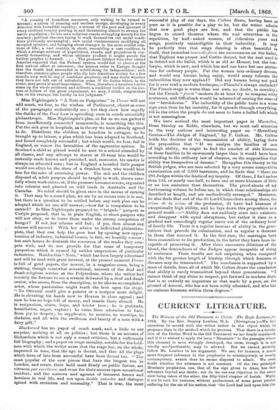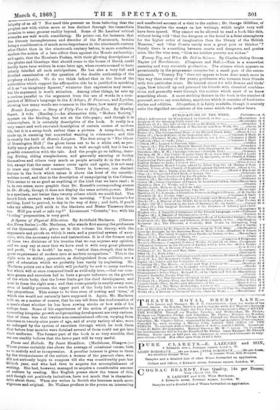CURRENT LITERATURE.
The Witness of the Old Testament to Christ. The Boyle Lectures for 1868. By the Rev. Stanley Leathes, M.A. (Rivingtons.)—We Soul ourselves in accord with the writer rather in the object which he proposes than in the method which ho pursues. That there is a revelation of the Divine Word in the Old Testament we are firmly convinced, and if it is wished to apply the term "Messianic" to the passages where this element is most strongly developed, the term, though it is not wholly unobjectionable, may be allowed. But we cannot isntirely follow Mr. Leathes in his argument. We see, for instance, a much more frequent reference in the prophecies to contemporary, or nearly contemporary, events than he seems disposed to admit. We oven doubt whether the reference is not constant. Of the two principal Messianic prophecies, one, that of the sign given to Ahaz, has this reference beyond any doubt; nor do we see any objection to the sumo view being taken of the other, the fifty-third chapter of Isaiah. Might it not be said, for instance, without profaneness, of some great patriot suffering for the sin of his nation, that 'the Lord had laid upon him the
iniquity of us all '? Nor need this prevent us from believing that the prophet saw with vision more or leas distinct through the immediate occasion to some greater reality beyond. Some of Mr. Loathes' critical remarks are well worth considering. He points out for instance, that the literary incompleteness and disorder of the Pentateuch, besides beings consideration of much more importance in the nineteenth century after Christ than in the nineteenth century before, is more conclusive against the notion of a late editor than against the Mosaic authorship; and again, that the Messianic Psalms, with their glowing descriptions of the glories and blessings that should come to the house of David, could hardly have been written in some later age, when events seemed to have utterly falsified all such anticipations. He has also a very full and detailed examination of the question of the double authorship of the prophecy of Isaiah. We do not think indeed that in the face of the authorities which support the affirmative side he is instilled in speaking of it as "an imaginary figment," whatever that expression may mean ; but his argument is worth attention. Among other things, he sets up a curious parallel to the argument from the use of words in a com parison of Milton's language in the L'Allegro, it Penseroso, and Lycidas, showing how many words are common to the three, how many peculiar. Breezie Langton : a Story of Fifty-Two to Fifty-Five. By Hawley Smart. 3 vole. (Bentley.)—An alternative title, " Modern Society,"
appears on the binding, but not on the title-page ; and though it is commonplace, it is certainly descriptive of the book. It really is a very smart and well executed description of certain scenes of modern Life, but it is a scrap-book rather than a picture. A scrap-book, well made up, is amusing but somewhat wanting in coherence ; and this is exactly the fault of Breezie Langton. The first scrap is " The Ghost of Bennington Hall ;" the ghost turns out to be a white owl, as probably many ghosts do, and the story is well enough told, but it has no possible connection with the tale. And the people go on talking, dancing, flirting, riding steeplechases, and generally amusing or boring themselves and others very much as people actually do in the world ; but, except that the same names occur again and again, it is not easy to trace any thread of connection. There is, however, one distinct feature in tho book which raises it above the level of the smartlywritten novel, and that is the description of campaigning in the Crimea. This seems to us as good as anything of the kind that we have read ; it is, in one sense, more graphic than Dr. Russell's corresponding scenes in Dr. Brady, though it does not display the same artistic power. Here is a specimen, not better than twenty others which we could find. The hero's Irish servant wakes him in the morning. " Your honour's for nothing, Lord be praised, to-day in the way of duty ; and faith, if you'll take my advice, ye'll stick to the blankets, and Mister Thravers there too. IViiiyou wash or take tag?" Lieutenant "Crumbs," too, with his ' looting' propensities, is very good.
A System of Physical Education. By Archibald Maclaren. (Clarendon Pres. Series.)—Mr. Maclaren, who stands first among the professors of the Gymnastic Art, gives us in this volume his theory, with the arguments and proofs on which it rests, and a practical system of exercises, with the necessary rules and instructions. It is of the former only of these two divisions of his treatise that wo can express any opinion, and we may say at once that we have read it with very great pleasure and profit. "It is health," he says, "rather than strength, that is the great requirement of modern men at modern occupations." This is the right note to strike ; gymnastics, as distinguished from athletics, are a part of education which we probably lose vastly by neglecting. Mr. Maclaren points out a fact which will probably be new to many readers, but which will at once commend itself as evidently true,—that our common games and exercises fail to have a proper influence on the growth of the whole body, that the lower limbs get the chief development, and next to them the right arm ; and that consequently in nearly every case, even of healthy persons, the upper part of the body fails to reach its due proportions. This seems to be true even of rowing and 'fives,' of which one would not naturally have supposed it. Again, Mr. Maclaren
tells us, as a matter of course, that he can tell from the conformation of mans chest whether he has been rowing stroke or bow side of his college boat. Somo of his experiences of the action of gymnastics in correcting irregular growth and promoting development are very curious. One of them was that twelve non-commissioned officers, varying from nineteen to twenty-nine years of age, and of every variety of size, wore so enlarged by the system of exercises through which he took them that before four months were finished several of them could not get into Their uniforms. The former part of the book is so very sensible, that we can readily believe that the latter part will be very useful.
Poems and Ballads. By Janet Hamilton. (Maclehose, Glasgow.)— Those poems certainly rise above the average of occasional verses, both as to melody and as to expression. A peculiar interest is given to them by the circumstances of the author, a woman of the peasant class, who did not seriously begin to compose till oho was considerably past her 'fiftieth year, and who had then to acquire the accomplishment of writing. She had, however, managed to acquire a considerable amount o f culture by reading. Her English poems show the traces of this, and though not positively imitations, have not much that is characteruntie about them. When she writes in Scotch she becomes much more Vigorous and original. Dr. Wallace prefixes to the poems an interesting
and unaffected account of a visit to the author ; Dr. George Gilfillan, of Dundee, supplies the essays on her writings, which might very well have been spared. Why cannot we be allowed to read a book like this, without being told " that the dungeon or the hovel is a fitter atmosphere for the higher order of imagination than the library of the British Museum," and "that Courts rarely rear a great poet or thinker "? Surely there is something between courts and dungeons, and genius cries, like the wise man, "Give me neither poverty nor riches."
Tommy Try, and What lie Did in Science. By Charles Ottloy Groom Napier (of Merchiston). (Chapman and Hall.)—This is a somewhat amusing and very eccentric production. Tho science which appears so prominently in the programme occupies but a small part of the enter. tainment. "Tommy Try" does not appear to have done much more in this way than many of the young gentlemen who torment their friends with this particular craze. He hunted about for will flowers and birds' eggs, blew himself up and poisoned his friends with chemical combinations, and generally went through the routine which moat of us know something about. A more striking feature in the book is the number of personal, not to say scandalous, anecdotes which it contains of local noterietios and oddities. Altogether, it is fairly readable, though it scarcely suits the dignified associations of the name which the author bears.



































 Previous page
Previous page